Are you starting your local SEO work at Customer #0, with few or no connections, few or no resources, and not much certainty as to where to begin? Working on local SEO for this new business may feel like you just moved to a foreign land with only the clothes on your back. You may not even speak the lingo. You’re starting with your wits, work ethic, presumably a computer somewhere in the trunk, and not much else. In other words, you’re starting with zilch.
Cold-start SEO (as I call it) is a mighty different thing from doing SEO for a company that’s been around for a while, has a customer base, maybe has a war chest, and probably has other resources you don’t. This may sound like a stretch now, but the local search results still are a place where it doesn’t take money to make money. Not only can you get visible and scrounge some business, but you also might be able to do it in less time than you think and not need to spend all your time working on it. IF you work smart and hard, stray off the beaten path a little, and don’t trust most of the advice you hear.
Most of my clients had been in business for a while before contacting me, and sought my help some time after the end of the beginning. But a few of my clients started working with me right around Day 1 of their business – that is, from a cold start. In some cases they had just started a new business, and in a couple of cases they had never been in business at all. In those cases it took a while, but we got visibility, customers, and some breathing room.
In my view, that’s always been the whole point and promise of SEO. It’s important for local SEO professionals (in particular) to be able to help businesses of all sizes and at all stages: well-established, in the middle, and just starting out. The stakes vary, and so does the poker strategy. In the cases where my client started with nothing, I also started with nothing to optimize (or at least nothing tangible). Either in spite of or because of the stakes, start-with-nothing SEO is oddly fun. That kind of thing gets me out of bed in the afternoon. As someone who also started my business with little in the rucksack, I often think of the start-with-nothing situation when I hear others’ SEO advice. It helps me keep a bead on what’s practical and what’s not.
Speaking of practicality, many of my suggestions in this post will help you even if you’re not starting out. You’ll benefit from these action items and SOPs even if you’ve been working on your SEO for a long time. But these strategies and principles are extra important to do if your business has been around for nary a hair past a freckle. In that case you don’t need to take all these bits of my unsolicited advice, but if you do few or none, you can expect extremely tough sledding and some worn-out dogs.
Below are 30 principles you can apply and strategies you can follow to get your local rankings and business moving even from a cold start. In all of these recommendations I assume only that you have time to work smart, because you sure as thunder do not have time to work dumb. By the way, in case you don’t have time for a long read right now, check out my one-page cheat-sheet summary. You can dig into the details later, if you want to ease into the list of action items.
Anyway, if you’re starting your local SEO with nothing (or nothing to show for your efforts so far), here are my suggestions:
1. Warm up as much as you can by using any relationships and resources you’ve got. The first principle of cold-start local SEO is that you should minimize the cold as much as possible. Emphasis on the “as possible” part. If you can, start the car at a balmy 35F rather than -2F to minimize the cold-crank amps you need to get the engine turning over. How best to do that depends on your situation, but at the very least you should tell any friendly souls you know that you’re in business now, and that you’d very much appreciate any good word that might produce a customer / client / patient, or someone who might know a few. Use a lifeline if Regis gives you one. Use what you’ve got, if anything. (Here’s a great book on that.)
2. Prioritize speed over detail or excellence. Once you realize that you’ll need to give just about everything at least a once-over or work on it continually anyway, you’ll also realize that your 1.0 version or first attempt doesn’t need to be great. Get your “service” pages up and presentable, rather than 100% to your liking. Start asking customers for reviews before you’re ready, or even before you’re certain they’re happy. Don’t try to get backlinks from household-name or industry-standard websites before you’ve gotten a few links from pint-sized local organizations. Don’t try to understand everything before doing anything. You don’t need to get it perfect: You need to get it started. Tell that little voice in your head to put a sock in it while you get some work done and get into your groove.
3. Deputize employees or partners to help you market, if possible. Maybe one person mostly handles the website and the other person writes stuff for it. Or maybe you do everything but ask customers for reviews and scrounge for links. However you choose to divvy up the work, try to find a Robin to your Batman. The main reason is you want to minimize the time you’re invisible. Local SEO takes long enough to pay off even when you’re working furiously, and even when everything’s going the way it should. Which leads me to the other, secondary reason to get a backup dancer: it’s a hedge. One overloaded person can easily get sidetracked with other obligations or projects, get burned out or confused, or waste time down a rabbit hole. Two people or an organization of 3500 people can, too, but at least the chances are better that someone’s working on something with payoff at any given time. By the way, this may also blunt your interest in hiring a company to help with your SEO at this early and fragile stage. If it’s the kind of place where you’re a number, your livelihood is an “account,” and no one person is responsible for your results, then you’re better off bootstrapping imperfectly and inconveniently for a while.
4. Make your website site at first mainly a receptacle to catch word-of-mouth referrals that you may not know about or that you’ll glean over time. I do mean your website; not your YouTube channel, not your Facebook page, not your Patreon, etc. In general, your website is the only thing online you own. Of the many ways it will serve you over time, its first mission is to be a catcher’s mitt to grab anyone who might have (miraculously) heard of you from a friend of a friend, a relative, etc. You may assume those people aren’t out there yet, but you may be wrong. So, if you do nothing else with it for now, just make it clear on your site what you DO, where you work, that you are available, and how to contact you. For now, it’s just a sandwich board.
5. Stick with a plain, old, or clunky site for longer than you’d like. A nice site will not help you now, and may not even help you later as much as you might think. As long as your site is functional on the most basic level, do not do a fancy launch or pay for a big redesign until you’ve got a customer base. It doesn’t matter if the site is slow, ugly, or currently ranks in Davy Jones’ locker. (On the off-chance you don’t even have a site yet and can’t even fork over for the tiniest of starter sites, just set up a Google Site for now; it can work, to a point.) If you put too much time and money into a new site, you will burn yourself out and not have the resources or the will to do the many other things you’ll need to do. If you must fix some components of it, like to avoid or recover from a hack, change just the critical stuff and buy yourself a year.
6. Eschew paid SEO tools for now. It’s fine if you only use free tools (particularly Google Search Console) and internal resources for a while. Some paid tools are excellent. They’ll still be around for you once you have more shekels to rub together.
7. Skip call-tracking, a fancy phone tree, and fancy booking software for now. Do you want to know how customers find you? Of course. Should you try to attribute every customer back to this or that source? Sure. But it’s only possible to do an imperfect job of that (it is WAY trickier than anyone realizes), and that’s only a challenge once you’ve got more than a few leads. In the meantime don’t make your site harder to develop, easier to break, and clumsier at fielding leads.
8. Don’t advertise on directories or pay for “premium” listings. I’m referring both to general directories in the mold of YellowPages and to directories that cater to your industry. By the way, don’t even think about running ads on Yelp until you’ve gotten a couple of reviews there. No matter how big Yelp is in your market, the ads only work when they’re a way to draw attention to your Yelp reviews, at least in my experience. Sometimes paid-inclusion directories or “premium” listings on free directories are worth the cost, but you can and should revisit that idea later.
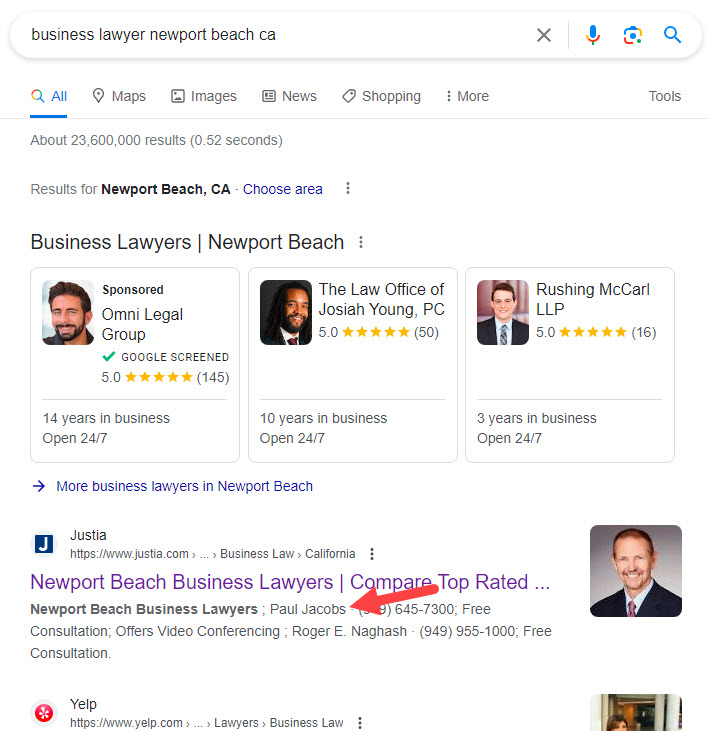
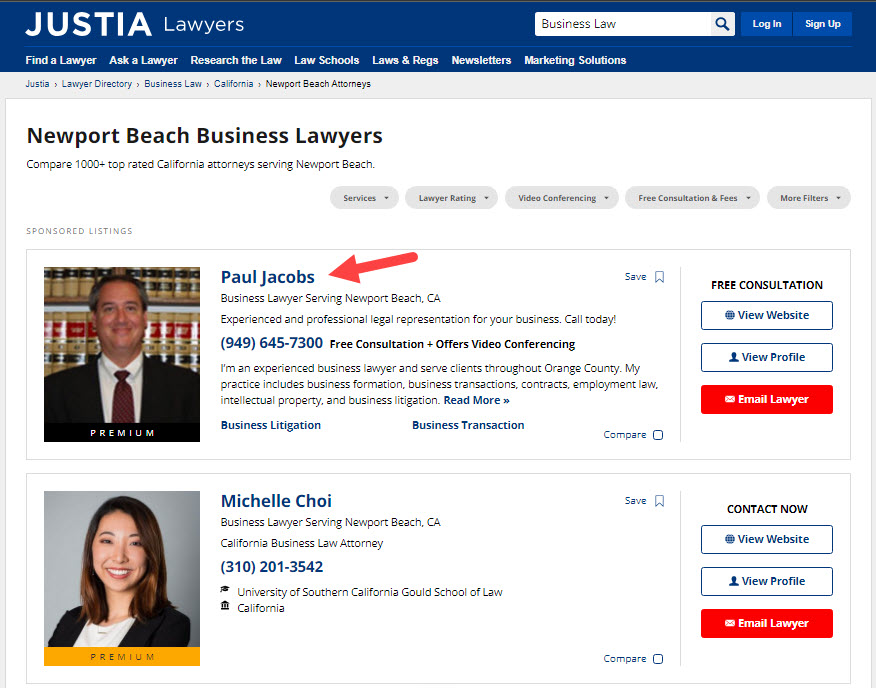
9. Don’t fixate on Google Maps (i.e. the 3-pack); focus more on organic rankings for local search terms. Visibility there is somewhere between important and critical for your business, but you must hedge your local search visibility, and you must do so early. The Map is too volatile for you to depend on it as your only or predominant source of customers. Local SEO is mostly organic SEO with a few twists. That means you need to focus on your site, early and long-term. Believe it or not, what you’ll find is that the Maps rankings often will be in the sidecar with your organic rankings, and they’ll pick up speed together.
10. Don’t spend much time or effort on citations. They don’t matter much to your local rankings, they don’t matter one pinch to your organic rankings, and working on them excessively will sap your time and energy to work on the many other things that you’ll need to work on. If you’re listed correctly on the basic sites, you’ll get whatever rankings benefit there is, you’ll have created the buckets where customers can drop reviews later on. In time the less-prominent sites will pick up your business and add you to their directories automatically.
11. Focus your content and any other efforts on creating and expanding the “money” pages on your site, particularly your “service” pages and homepage. I’m referring to the sorts of pages most likely to rank earliest and with the least amount of effort, which also happen to be the pages most likely to be visible and persuasive to local people with open wallets. Do not write blog posts or create “city” pages any time soon. Devote all of your work to the following areas: (a) you make your homepage comprehensive and powerful, (b) create the most and best “service” pages you can muster, and (c) create pages on small, unusual, one-of-a-kind, loss-leader, or experimental services – what I call “spin-off pages.” When in doubt, focus your efforts on making detailed and persuasive service (or product or treatment or “practice area” pages). Spin-off pages can rank with relative ease, but more important is they can get you small-fry jobs that you can use as success stories, or that you can photograph or film, or get reviews from, or use to get referrals. This may be the single most-critical action item of all of the action items on this whole list, behind only the major principles in importance.
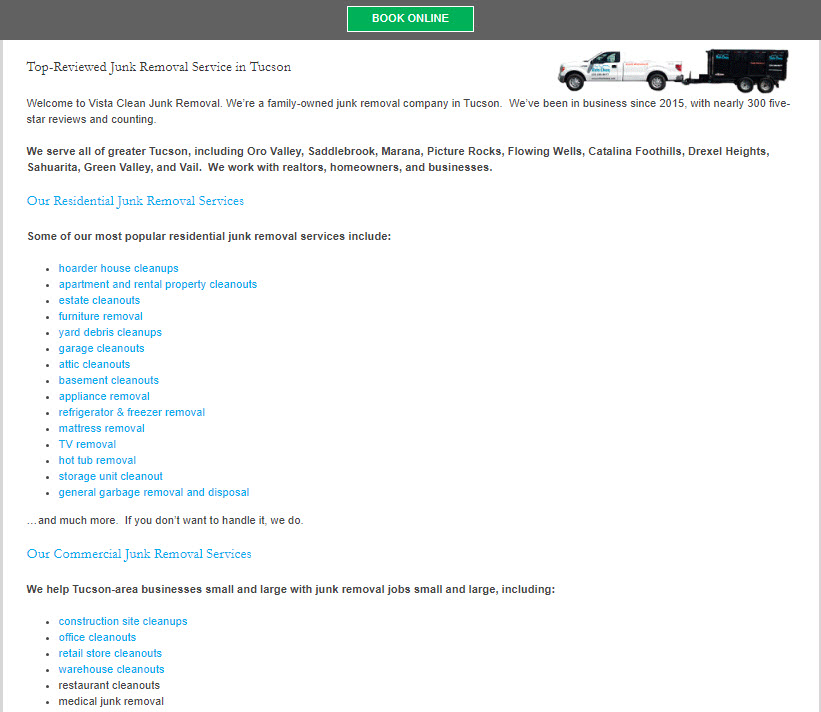
12. Study any data you can get from any old businesses or sites, or from a friend’s or relative’s business, if possible. Any intel you can glean can be helpful, including data on what services are most popular or profitable, which communities have the most or best customers, which search terms are most or least competitive, etc. Data from any source is probably enough to give you a whiff of what you want to know, but I’m thinking of Google Search Console data or Google Ads data in particular. Don’t reinvent the wheel if you don’t need to.
13. Study your Google Search Console data early, often, and for as long as you’re in business. Search Console is your best friend. Study its data whenever something seems to be going wrong, or whenever you need fresh data or long-term data (or both) on how you’re faring. The “performance” area is the most helpful on a day-to-day basis, but you’ll also want to monitor the former “coverage” area and the “internal links” report, and you should go in to request fast indexation of every new page you create.
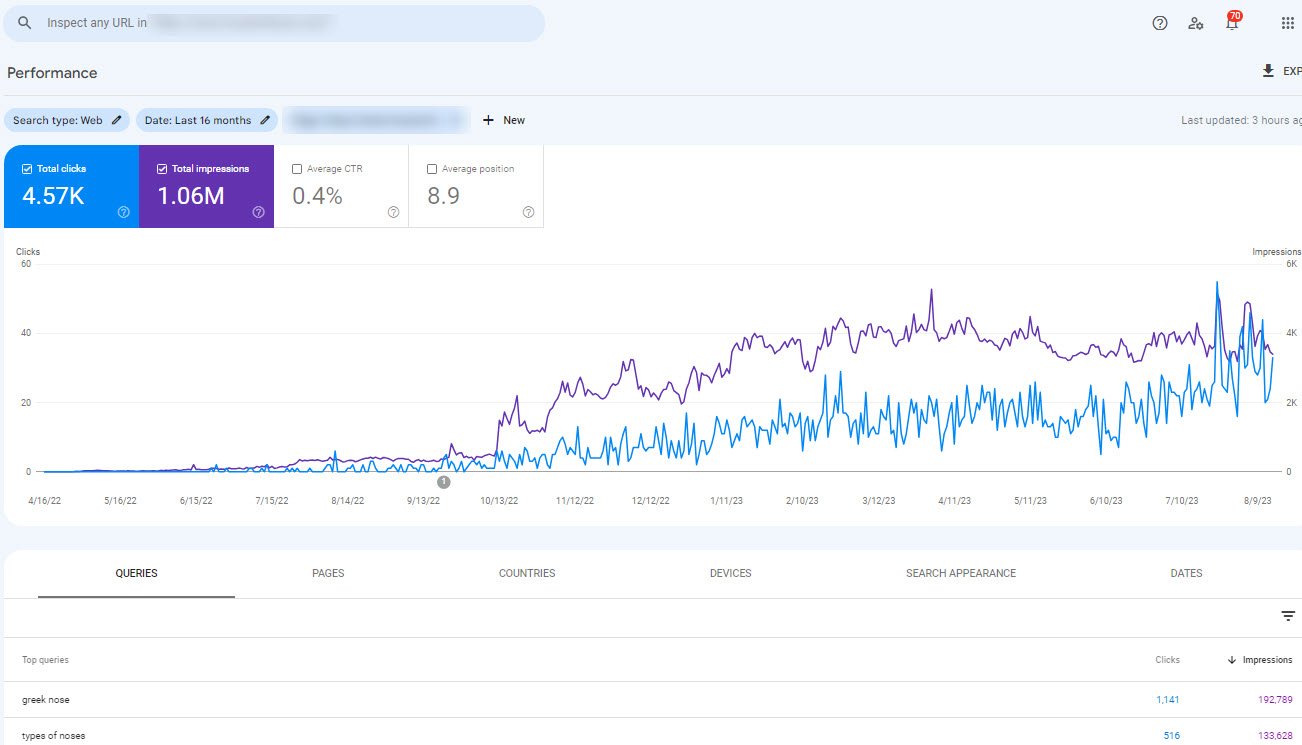
14. Obsess over indexation of new page and internal linking to all pages you care about. Some pages, once indexed, can rank more quickly than you might think, but Google’s indexation is slower and trickier when your site is new, sparse, and not crawled too frequently. The good news is that the best remedy is easier to execute when your site is a pipsqueak: It’s easier to go heavy on the internal links when you have 20 pages than when you have 193. That’s what I suggest you do. Load up your main navigation, footer, and homepage with links to new and high-priority pages, and do likewise on other pages and on the new pages whenever you can. Make sure Google Search Console has chowed down on your XML sitemap. Keep an eye on the “Performance” area of Search Console, and if and when you see any flat lines on the graph for a page, submit that page manually for indexation.
15. Use Google Ads as a weather balloon for premium data. Some of the best intel you can get anywhere is in Ads. Which means you need to pay for the data, but that doesn’t mean you’ll need to sell all your camels. It also doesn’t mean your Ads campaign needs to yield any customers, or that you should use it long-term. Just set up a campaign that targets the immediate area where you hope to rank, create a few adgroups with a few straightforward broad-match keywords each, put it on a low budget, and run it for a week or two. Then comb through the “search terms” and “locations” reports and maybe other reports and see what you’ve got. Tweak your on-page SEO accordingly and pause the Ads until you want to start playing for all the marbles. The point of this process isn’t to get any customers, but it’s a pleasant surprise if you do.
16. Make your service area or target area explicitly clear throughout your site, to the point you fear you’ve become repetitive. The homepage, contact page, and footer should list the specific communities or other areas you consider your high priorities – the places where most of your prospective customers live or work. Ideally you also do the same on your “service” pages and on a “service area” page. Depending in huge part on the search term (i.e. service or product) and on the density of local competitors, sometimes all it takes for you to pop into the Maps or organic results in a specific place is to mention that place a couple of times on a page.
17. Focus your on-page and maybe other local SEO work on a VERY small geographical area at first. As in one specific town or neighborhood or two where you think or know the best or most possible customers are concentrated. Often it’s easier to rank in a super-targeted, “hyperlocal” area: Just as Google often favors specialists in this or that niche in the search results, particularly on the Map, often Google also favors businesses that focus on very tight geography. After you get some solid rankings nearby and get a solid clientele, you can always choose to expand. By the way, if you’re in a rural area, a relatively tight geographical focus (e.g. one county) might be a pretty large area – and you’ll probably still rank well there. (As you may have guessed, I’m referring to an area much smaller and more focused than the Tri-State area, the Chicagoland area, LA, DFW, or some other huge and hard-to-define blob of land.)
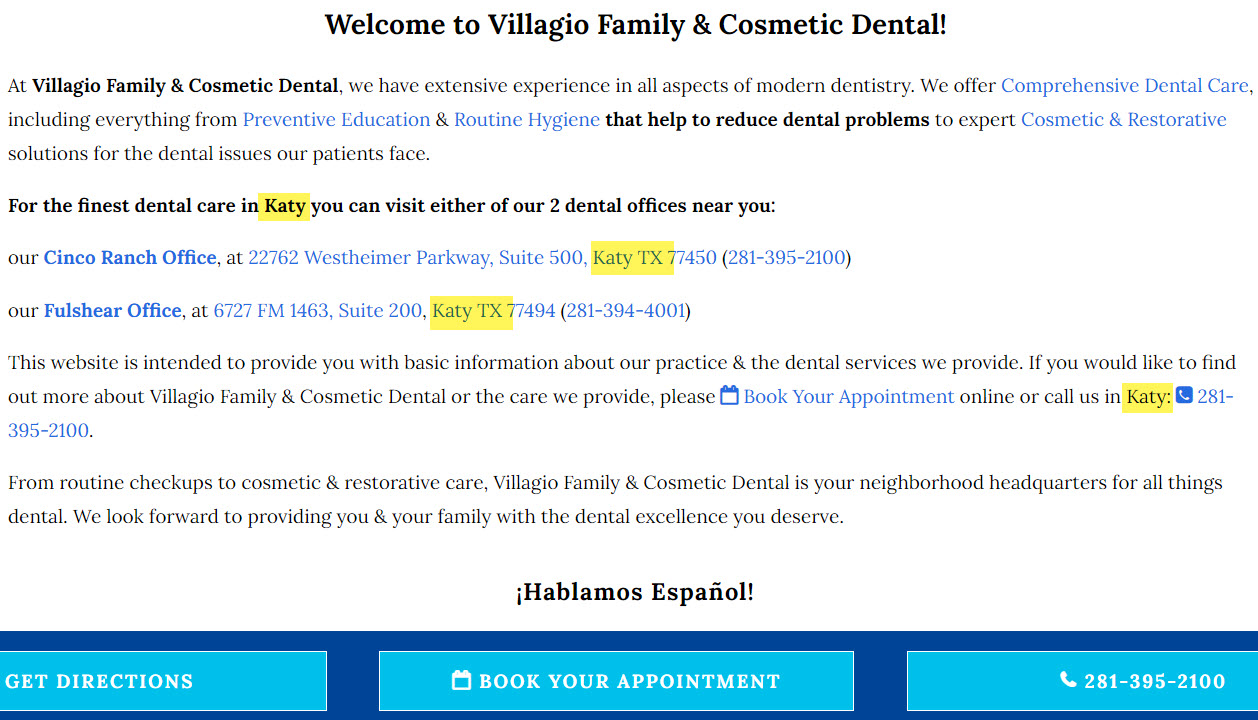
18. If you’ve got a service-area business, be willing to travel far for early customers if and when you get them. This doesn’t contradict my previous suggestions: your SEO efforts should target a tight geographical area, but that doesn’t mean you should turn away customers who might be outside of that little circle. Those people are your early success stories and potential referral sources. Again, if serving those customers is impractical long-term, later on you can always tighten up your service area and make it stricter. Also, you can always refer those farther-away leads to a business owner who wants customers in those areas. (More on this point later.)
19. Get success stories, case-studies, verifiable testimonials, or other specific examples of good work early on, by hook or by crook. Many people don’t want to be be customer / client / patient #1, but have no problem being your 4th. Of course, others are down with lab-chimp status if it’s clear you do good work and that your business is just new, especially if you can offer them a hell of a good deal. Treat those people like royalty, ask them early whether they’re OK with your citing them as an example on your website, and then walk the walk. By the way, these can be local SEO gold, whether as videos or as the core of some “city” pages.
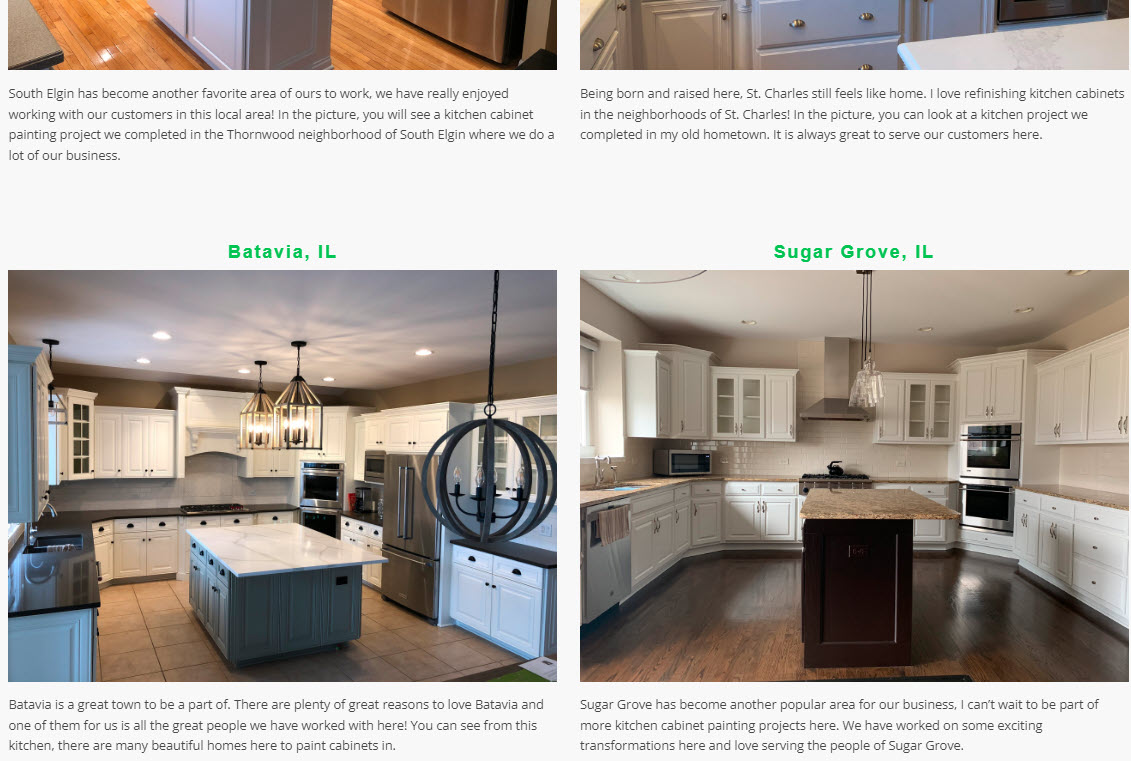
20. Target a 2nd language if you can, on your site, on your Google Business Profile, and maybe on your other local listings and maybe in your YouTube videos (if applicable). It’s possible your Spanish or Mandarin pages (for example) might rank easily while your other pages don’t rank for squat. It also may be that your earliest customers have been looking for someone who does what you do and who also speaks their native or preferred language. You may speak only one language, but someone on your staff speaks two or more at a professional level; that’s fine, and my suggestions still apply. If you do nothing else, at least (a) add a “[language] spoken here” section to your homepage (in that language), and (b) create a version of your most-important “service” pages in your other language(s) and link to those pages noticeably on your site. For extra credit, fill out your Google Business Profile “services” section with all of your services listed in the other language, and do a few videos in the other language and embed them on your site. In time you’ll probably get some reviews from customers in your other language, in which case you should embed their reviews on your alternate-language pages.
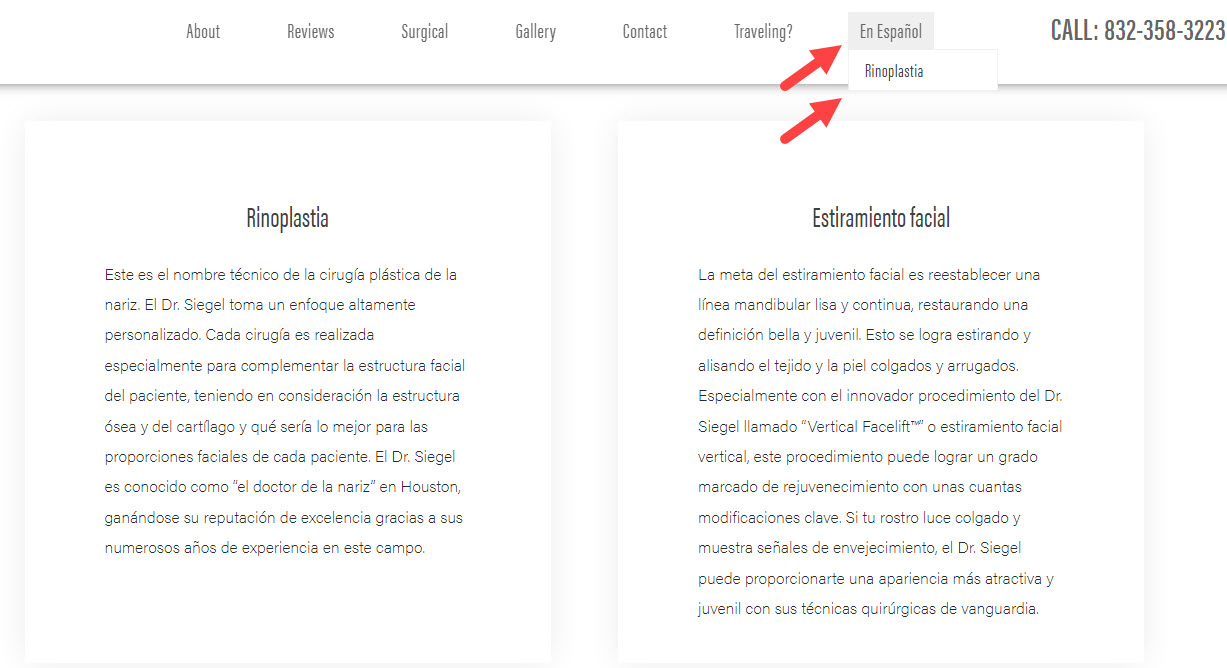
21. Hit the copywriting hard right out of the chute. If you don’t, your rankings may not amount to more than a hill of beans, because you won’t get enough customers out of the effort you put in. What I mean by “copywriting” is: Don’t emulate the junk mail you get or the online marketer who needs a chill pill, and don’t even think about getting “SEO copywriting” (a flawed concept). Rather, plainly state what you do, whom you do it for, where you work, any real-life examples you can show, and maybe some photos and FAQs. Wordsmith everything you can. (I can’t possibly do even a sliver of this topic justice in this post. Copywriting is a major part of what I do for about half of my clients. Let me know in the comments if you’d like some examples, perhaps relevant to your industry.)
22. Get a few small-fry links from locally relevant sites earlier than you think you might need them. Picking up a few solid early links early isn’t essential, but it helps. Like from local charities or events. They don’t need to be glamorous or tough to get, but they should require a small amount of effort or a small donation or offering of some kind. Here you may object: “But I have so much other work I need to do, and I’m bootstrapping this thing, and I need customers before I can do much else.” True enough: you might get all the traction you need without touching links. But link-earning shouldn’t be the very last thing you work on, after exhausting everything else only to find that your local rankings are OK but not great. I’ve found that getting even a couple of links from humble little local sites early in your efforts can make your other work more likely to put antlers on your wall.
23. Treat reviewers and potential reviewers like royalty. Sooner or later you’ll get a few early customers. When you do, you want them not only to review you, but also to go into great detail in their reviews, maybe upload photos, maybe review you on a 2nd site, maybe have their spouses or other family members also write accompanying reviews, and maybe refer a friend or relative and build your word-of-mouth gravitational pull. That means, for one thing, you need to treat them like royalty when they’re only customers and you don’t yet know whether they’ll review you.
24. Start Google Maps spam patrol early and stick with it. Google won’t remove or correct all of the Google Business Profiles you report, and some of your competitors will never stop with the bogus addresses and fake names and shaky reviews. But in time you will thin the herd, you will slow down competitors who flout the guidelines you stick to, and you may even deter newcomers from assuming the only way to get ahead in your market is to spam.
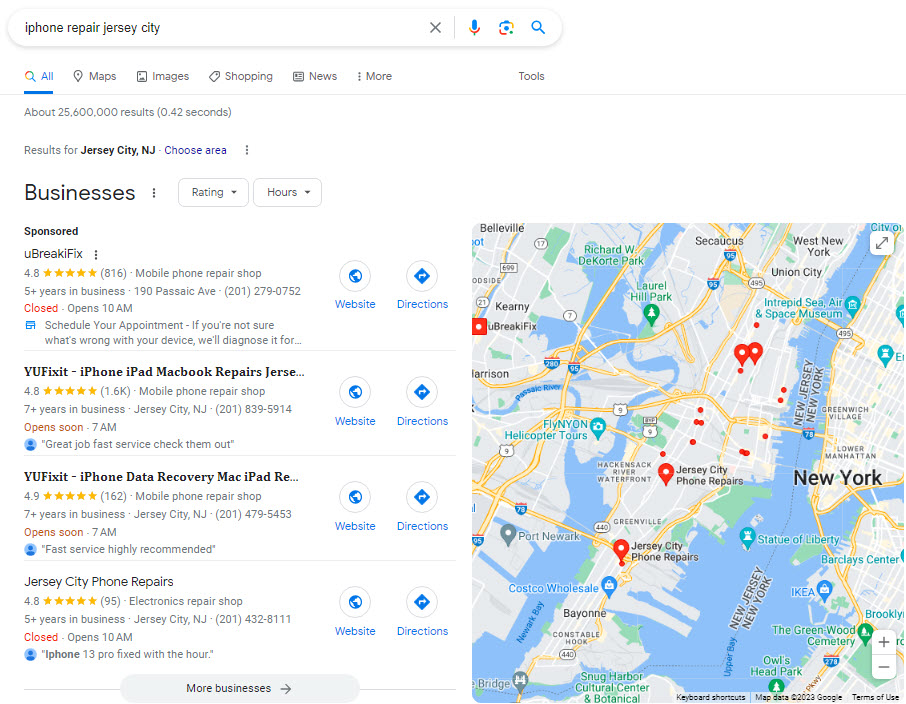
25. Fish in ponds your competitors don’t: different media or sites. By that I mean if your competitors have blog posts that rank for money terms, but none has a YouTube video that does, fire one downrange. If none seems to have been on a locally or professionally relevant podcast, find a podcaster who’s more desperate than you are and show up. If none of your competitors has any or positive reviews on the Better Business Bureau, and especially if that site ranks for some local search terms you like, become the first to get a few 5-star reviews there. You get the idea. Meander a little bit off the beaten cowpath. Doing so can help your Maps or organic rankings (or both) in ways direct or indirect, and it always helps you cultivate some non-Google online visibility.
26. Partner with a competitor by helping him or her from time to time. Like by referring leads that the other person might like a little more than you do, with the hope and understanding that that competitor will reciprocate in some way. Now, I realize that that may be too cold a shower to hop into right away. One relatively comfortable way to back into it is to alert the competitor to a problem you see – like some mistake on their website, a bad review they seemed to miss, etc. It can be pretty mundane, but it’s just a way to break the ice. Don’t make mortal enemies of them if you can avoid doing so. You can be more like Gilgamesh and Enkidu, Spock and McCoy, etc. Of course, if the competitor tells you where you can stick your olive branch, or if they badmouth you or just never return the favor in any way, then maybe you stop being such a sweetheart.
27. Take up a cause and fly the flag on your site. Offer something of value to, donate money to, or donate some time to an organization or group that needs it. Of course, the main place to do that is on your site, but you might also do it on platforms you don’t control much (e.g. YouTube). It doesn’t matter if you’re not in much of a position to help yet. (A couple of years into my local SEO career – 2011 – I decided to offer pro bono help to veterans, even though I sure could have used the dough at the time. That was the right move.) It doesn’t matter what the cause is, but don’t virtue-signal: Make it clear what you have done for the cause or what you’re doing now, or both, and how you hope others will pitch in (and how you’ll thank them for it). Maybe nobody who needs your offer will take you up on it any time soon. Maybe you turn off some customers, but win points with others. Maybe nobody even takes you up on your offer. That’s OK. Whatever the immediate outcome, as long as your offer is genuine and you follow through on it (and maybe explain why you care about the cause), you’ll help people, create some good vibes, possibly cultivate word-of-mouth referral sources, and maybe get some favorable press or a local link or two.
28. Try to get “practitioner”Google Business Profiles visible in the local 3-pack. Let’s say you have a dental practice with 3 dentists. Maybe everyone does a little of everything, but you have one doc who mostly does oral surgery and implants, another who mostly does braces, and one who focused on cosmetic procedures. First you create 3 bio pages, one for each doc (in addition to the one for the practice), each describing and optimized for his or her specialty within dentistry. Then you create 3 Google Business Profiles, each in his or her name, each pointing to his or her bio page as its landing page URL, and each with the best-fitting category. Then you build local citations for each dentist, using the same info as is on his or her GBP page. In time each dentist gets reviews on Google Maps and maybe elsewhere, and maybe you try to earn a couple of links to his or her bio page. Of course, you’d have a similar setup if you’ve got a law firm or insurance agency or therapy practice (etc.) where everyone’s specialties are a little different. Likewise if you’ve got a bricks-and-mortar store or showroom with multiple “departments,” in which case each department should get its own dedicated page on your site and probably should get its own GBP page. The idea is to divide and conquer. Each GBP page may rank on the map for specialized search terms, in addition to the terms the main practice or overarching business ranks for. This may be especially helpful if you’re not ranking for zip yet, or even if your rankings have dipped or tanked.
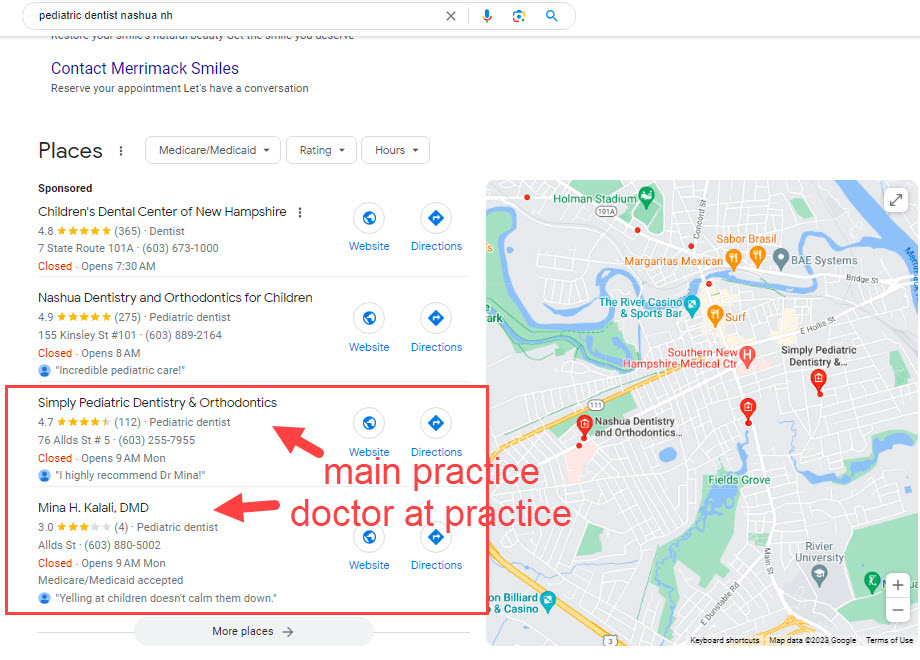
29. Create a “Media” or “Interview Us” page, where you make it REAL clear that you can provide an interview, soundbite, quote, or professional opinion to anyone covering your industry. This page should clearly state what you do for a living, your experience and maybe other qualifications, enough about your background that your “angle” is clear to journalists or others, how one can contact you, and what your general turnaround time is. This page can help you get your first or next appearance in the local rag, the paper of record, a blog of whatever size, a podcast, etc. In the process you may get a link or two. Most importantly, it will help break the airlock that may have kept others from contacting you and citing your expertise. Most journalists or hosts or bloggers don’t like to be the first, but sometimes you can present them an offer they can’t refuse and they take a flier on you. Once you’ve shown even one solid example of someone’s citing your professional opinion on something, others are more likely to cite you. You need to get lucky only once. Your media page probably won’t rank for terms anyone types into Google, but the interviewer can wind up on your site other ways and then see your media page.
Here are some examples that I’ve seen first-hand to be effective:

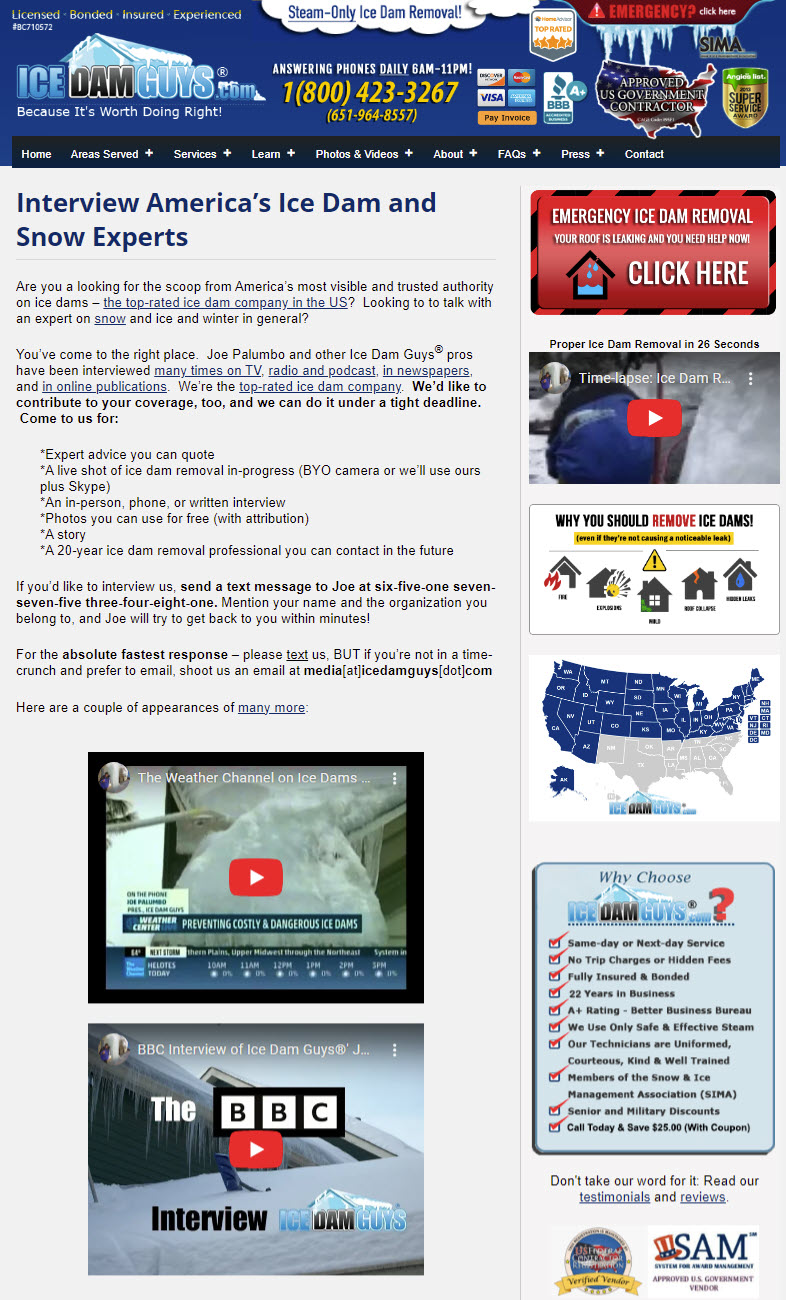
centralmassauctions.com/auctioneer-available-for-interviews-quotes-research
Here are a few other examples for you to consider: minarsdermatology.com/media-mentions, justmind.org/media, (thanks to Wes Michy for those two examples), and marclamber.bio. (Darren Shaw, who shared that last example with me, says that attorney built that separate “bio” site partly because it’s a way to give journalists info they may want, without slowing down would-be clients with that info. You might consider a whole separate “Interview Me” site, rather than just a separate page, if your bona fides just seem out-of-place on your site.)
30. Continually read my stuff and the resources I link to. Those include my blog posts, my newsletter emails, and my free guide. I’m a fellow traveler, and of course there’s a lot I’m still finding out. But I’ve done local SEO since its very early days, and I’ve gotten more nasty stuff stuck in my boot waffle than just about anyone. The dos and don’ts I share can help you get to tidy pastures, and sooner. Read a little and apply a lot. Pain now means (relative) freedom later.
—
Businesses, their owners, and their marketers tend to get a lazy over time. They’ll usually relax a little if they’ve weathered some storms, had good local rankings and plenty of customers, and especially if they’re large or expanding. Needing to pause or ease up, or wanting to be “done,” is a natural impulse, and it’s understandable.
The flipside is that more-established businesses often also take their local visibility and customers for granted. They might assume that the SEO work is behind them, or that they know exactly how to get more customers like the customers they’ve got. Those are two faulty assumptions, and they are your openings. You may not need to outwork all of your competitors, but you do need to exploit some of their gaps. David didn’t out-hustle Goliath. He just identified a spot where the big guy let his guard down, and he took his shot.
Right now, pretty much every one of your competitors has at least one of these serious vulnerabilities:
- Assuming they’re done or mostly done with SEO (no such thing).
- Risk-aversion: only trying strategies that they’ve seen someone else do, or only considering strategies that have worked for them in the past, or only considering strategies that (they think) have little or no downside.
- Focusing on action items that seem easy, easily replicable, or scalable instead of working on miserable work that works (e.g. getting some links).
- Analysis paralysis: they drown in data that’s useless, or don’t focus on the vital signs (particularly Search Console data), or don’t make fast and big changes based on data.
- Forgetting soft skills: customer service has slipped down about to priority #9 on the list, reviewers aren’t approached like Don Corleone on the day of his daughter’s wedding, and competitors are only adversaries and not possible kinda-sorta allies.
- Wasting money on tools and services they don’t need or don’t wield effectively.
- Wasting time and effort on stuff Google and customers don’t care about much (e.g. extraneous local citations or website cosmetics).
- Not reading up, or reading up only on “SEO news” and ignoring advice that always works and always will.
Each of those is an opportunity for you, if you’ll take it. So nibble on the list of 30 action items and principles. You may find it tedious. But as you’re working on it, and right around the time you wonder if it’s just an exercise in patting your head while rubbing your tummy, you’re likely to see your first blips of local visibility, and soon after your first customers will darken your door, seemingly by accident. By that point the hardest part will have come and gone.
—
Once more, here’s the link to my one-page cheat sheet.
Did you start your SEO with nothing (or almost nothing)? If so, what did you find to be a breakthrough moment, or what do you wish you did differently?
Are you in a similar scroungy situation now?
Any questions?
Leave a comment!


Recent Comments